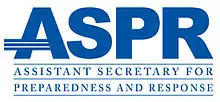Emergency Care Coordination Center
The Emergency Care Coordination Center (ECCC), within the Office of the Assistant Secretary for Preparedness and Response (ASPR) in the U.S. Department of Health and Human Services, is the policy home for the emergency care community within the federal government. The ECCC seeks to strengthen the day to day emergency care system so that the nation is prepared in times of crisis.[1]
 ASPR Logo | |
 ECCC Logo | |
| Agency overview | |
|---|---|
| Formed | January, 2009 |
| Website | Emergency Care Coordination Center |
Mission
To lead the United States Government’s efforts to create an emergency care system that is patient- and community-centered, integrated into the broader healthcare system, high quality, and prepared to respond in times of public health emergencies.[2]
Goals
The ECCC is framed around 4 key goals as described in the mission statement above.
- Emergency care systems will be patient- and community-centered.
- Emergency care systems will be fully integrated into the health care system.
- Emergency care systems will deliver high quality care.
- The emergency care system will be prepared to respond in times of disasters and public health emergencies.
Background
In 2006, the Institute of Medicine’s (IOM) Committee on the Future of Emergency Care in the United States Health System released its findings on the state of the U.S. Emergency Care System in three volumes. The reports, titled Hospital-Based Emergency Care: At the Breaking Point;[3] Emergency Medical Services: At the Crossroads;[4] and Emergency Care for Children: Growing Pains[5] describe a system that is “overburdened,” “underfunded,” “highly fragmented,” and “increasingly unable to appropriately respond to the demands placed upon it each and every day.”[6] Recognizing the precarious state of the emergency care in the U.S., the IOM recommended the development of “regionalized, coordinated, and accountable emergency care systems throughout the country.”[7] The report also recommended that Congress “establish a lead agency for emergency and trauma care…housed in the Department of Health & Human Services (DHHS).”[8] Following the IOM report in 2007, Homeland Security Presidential Directive #21 mandated the creation of an office within DHHS that would “address the full spectrum of issues that have an impact on care in hospital emergency departments, including the entire continuum of patient care from pre-hospital to disposition from emergency or trauma care.”[9]
Charter
The Emergency Care Coordination Center was established in January 2009 within the Office of the Assistant Secretary for Preparedness and Response (ASPR) in DHHS. The ECCC’s charter was published in the Federal Register on Wednesday, April 29, 2009.[10]
Organization
The ECCC supports the ASPR mission by focusing federal efforts on improvements to the delivery of daily emergency care that are the foundation of response to disasters and public health emergencies. The ECCC is an essential part of Office of Policy and Planning (OPP),[11] and the Division of Health System Policy (DHSP).[12]
Partners
The ECCC works in close coordination with the Federal Interagency Committee for Emergency Medical Services (FICEMS) and its supporting agency, the National Highway Traffic Safety Administration’s Office of Emergency Medical Services (EMS).[13] While FICEMS specifically focuses on issues relating to pre-hospital care, the ECCC and FICEMS work together to coordinate and align the efforts of the Federal Government throughout the entire spectrum of the emergency care system.[14]
Current Director
On December 4, 2013, Brendan G. Carr, MD, MA, MS was announced as the director of the ECCC. Dr. Carr is residency trained and board certified in emergency medicine, and completed fellowships in trauma and surgical critical care, as well as in health policy research at the University of Pennsylvania as a part of the Robert Wood Johnson Foundation’s Clinical Scholar program. Dr. Carr’s research focuses on the association between emergency care system design and outcomes for unplanned critical illness including trauma, stroke, and cardiac arrest. He remains clinically active, caring for patients in the Emergency Department. In 2010, Dr. Carr led a national conference to define the research agenda for regionalized emergency care systems.
References
- "Emergency Care Coordination Center". Archived from the original on 2014-03-24.
- "Emergency Care Coordination Center". Archived from the original on 2014-03-24.
- "Hospital-Based Emergency Care: At the Breaking Point". Archived from the original on 2014-03-31.
- "Emergency Medical Services: At the Crossroads". Archived from the original on 2014-09-05.
- "Emergency Care for Children: Growing Pains". Archived from the original on 2014-12-30.
- "Institute of Medicine of the National Academies".}
- "Institute of Medicine of the National Academies".}
- "Institute of Medicine of the National Academies".}
- "HSPD 21".
- "Federal Register Volume 74, Number 81".
- "Office of Policy and Planning".
- "Division of Health System Policy".
- "Federal Interagency Committee on EMS". Archived from the original on 2014-05-06.
- "74 FR 19561".